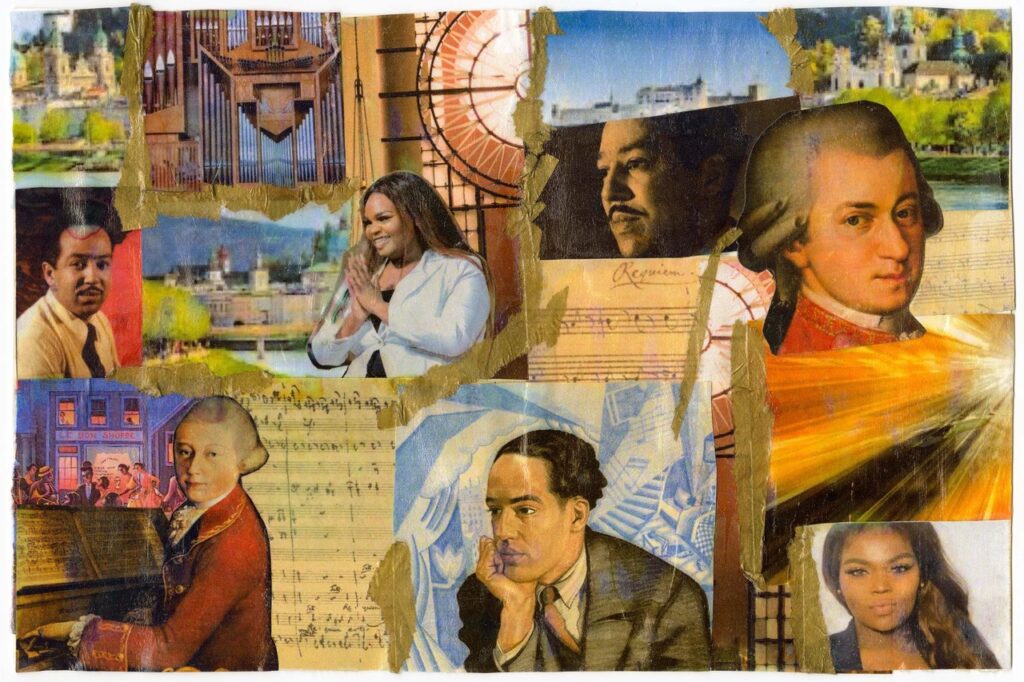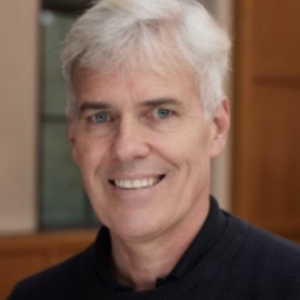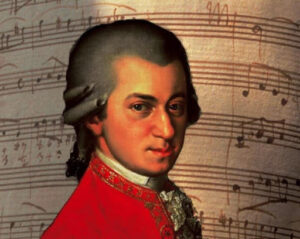
Saturday, March 15, 2025 at 8:00 pm
Pre-concert talk at 7:00 pm by director Freddie Coleman
Featured Works
Requiem in D minor, K. 626 by Wolfgang Amadeus Mozart
Epoch of Hughes by Jasmine Barnes (world premiere)
Mozart’s Requiem is one of choral music’s undisputed masterpieces. Yet it presents a paradox, since it was incomplete when Mozart died. We hear the completion by his student Franz Xaver Süssmayr, at once noble and sobering. The genius and power of Mozart’s splendid choral and solo vocal writing grip one’s attention throughout this moving, powerful Requiem.
Paired with Mozart’s timeless masterpiece is Jasmine Barnes’ Epoch of Hughes, a groundbreaking new work created specifically for the Seattle Choral Company. This piece is inspired by the poetry of Langston Hughes, one of America’s most celebrated Black poets, and uses Hughes’ reflections on the four seasons as its foundation.
Our premiere represents an exciting addition to the contemporary choral repertoire, and audiences will have the rare opportunity to hear Barnes’ work brought to life for the first time. Jasmine Barnes herself will be in attendance for this historic performance, making the evening even more memorable.
Guest Artists

Jasmine Barnes, composer
 Ellaina Lewis, soprano
Ellaina Lewis, soprano

Sarah Mattox, mezzo-soprano

Stephen Rumph, tenor
 Zachary Lennox, baritone
Zachary Lennox, baritone

Members of the North Corner Chamber Orchestra
About the Music

Wolfgang Amadeus Mozart
In December 1790, Joseph Haydn left Austria for London with the violinist and entrepreneur Johann Peter Salomon. He spent his last day in Vienna with Mozart. When they parted, Mozart embraced his friend and said, “Papa, I fear that this will be our last farewell.” Haydn, no longer young at 59, took Mozart’s remark to be concern for his welfare on such a long journey to a distant country. As it happened, Mozart’s words were prophetic of his own death. Haydn outlived his younger contemporary by 18 years and produced superb music in his old age. When he died in 1809, the work performed at his funeral was the Mozart Requiem.
Mozart rarely composed without a specific commission, and the Requiem was no exception. During summer 1791, he was hard at work with Emanuel Schikaneder on The Magic Flute. The new opera went into rehearsal in July. About the same time, a mysterious stranger presented himself to Mozart at his residence, with an unusual assignment: a Requiem mass, to be composed and delivered as soon as possible. The stranger declined to identify himself or the originator of the commission and cautioned Mozart not to attempt to learn anything further about his employer.
We know these facts from written reports by Mozart’s contemporaries, including his widow, Constanze, and her second husband, Georg Nikolaus Nissen, who was one of Mozart’s first biographers. Only after Mozart’s death did the full story emerge. Count Walsegg-Stuppach, an Austrian nobleman and music lover, fancied himself a composer. Lacking real talent, he often commissioned works by well-known composers for private performance, recopying the works to pass them off as his own.
In February 1791, the Count’s wife died. Stricken, Walsegg resolved to secure a Requiem to be performed annually on the anniversary of her death. He sent the messenger to Mozart with the request, instructing his representative to maintain secrecy.
Needing money, Mozart accepted the project and set to work, then put the Requiem aside when Emperor Leopold II was to be crowned King of Bohemia. For that occasion, Mozart was asked to compose an opera seria. Composing with lightning speed, he completed most of La clemenza di Tito in an astonishing 18 days, before travelling to Prague to supervise rehearsals and the premiere. His frenetic pace included ongoing work preparing for The Magic Flute’s opening. One starts to understand the extreme degree of nervous exhaustion that compromised his health.
After Mozart returned from a trip to Prague in September 1791, the unidentified emissary called on him repeatedly to check on its progress. Unable to determine the origin of the eerie commission and drained from overwork, Mozart became convinced that a messenger from the netherworld had been sent: that he was composing his own Requiem.
At this point, Mozart’s health deteriorated. Battling dizziness, headaches, swelling and nausea, he continued to work on the Requiem. With the assistance of a composition student, Franz Xaver Süssmayr (1766–1803), he sketched several movements, orchestrating the first few measures of some, concentrating on the vocal lines, providing only limited instrumental detail in others. At Mozart’s death on December 5, the Requiem lay incomplete.
Constanze Mozart was unable to collect the fee owed to her late husband until the missing parts were completed. She approached several Viennese composers, eventually settling for Süssmayr, who had worked closely with Mozart during his last months.
One of Süssmayr’s cleverest ploys to conceal the participation of a second composer was to conclude the work with the repetition of the music heard at the beginning. Mozart had used this same type of self-quotation in earlier masses, so the tactic was stylistically consistent—and very convincing. So successful was Süssmayr’s reconstruction and completion that the Requiem has become one of the most frequently performed choral works in the classical repertoire. Also because of Süssmayr, the Requiem is a thorny topic in Mozart scholarship, with musicologists and performers debating how much of the music is Mozart’s and how much his gifted student’s. The Requiem’s inherent beauty and remarkable contrapuntal skill assure its following, regardless of questions about authenticity.

Jasmine Barnes
Jasmine Arielle Barnes, born on September 28, 1991, is an Emmy Award-winning American composer and acclaimed vocalist whose work has been performed worldwide. Her compositions have been described as “precisely imagined” by the Washington Post and “refreshing, engaging, exciting” by San Francisco Classical Voice.
Barnes specializes in writing for the voice and has composed five operas, including “The Late Walk,” “Star Arts High,” “The Burning Bush,” “I Will Follow You Into The Dark,” and “She Who Dared.” Her opera “The Late Walk,” commissioned by Bare Opera as part of the Decameron Opera Coalition, has been archived in the Library of Congress.
She has received commissions from prestigious organizations such as the New York Philharmonic, Washington National Opera, Chicago Symphony Orchestra, and Aspen Music Festival and School. Her work has been performed by notable artists and ensembles, including LA Opera, Wigmore Hall, Fresno Philharmonic Orchestra, and Portland Opera.
Barnes is a member of “The Blacknificent Seven,” a collective of composers including Damien Geter, Jessie Montgomery, Shawn Okpebholo, Dave Ragland, Carlos Simon, and Joel Thompson. She holds both Bachelor and Master of Arts degrees in Music from Morgan State University in Baltimore, Maryland, where she was the first composition major and held a debut composition concert titled “Reality Race and Religion” in 2018.
In addition to her composing and performing career, Barnes is an educator and former Head of Compositional Studies and Jazz Voice Studies at Booker T. Washington High School for the Performing and Visual Arts in Dallas, Texas. She is managed by UIA Talent Agency and is based in Dallas, Texas.
Her notes on Epoch of Hughes reveal the following:
Growing up in Baltimore Maryland’s public school system, I spent many years learning Langston Hughes’ poetry. I was always intrigued by the meaningful and poignant text he’d write. Poems like “Mother to Son”, “I, Too”, “Dreams”, and so many others, but I wasn’t privy to the poems of EPOCH OF HUGHES — “Poeme d’Automne”, “Winter Moon”, “An Earth Song”, and “Summer Night” — in my childhood. I learned of Margaret Bonds’ setting of “Poeme d’Automne” and “Winter Moon” a few years ago, both from her song cycle with Hughes,“Songs of the Seasons”. I’d like to say I created my own interpretation of these poems, and as a fellow Black Woman composer, I’m proud to follow in her footsteps and create my own setting of this gorgeous text.
As Barnes explains, “These poems collectively tell a story of an epoch, or a passage of time, in Hughes’ life, serving as an homage. Each poem reflects the world around the poet. I chose to immerse myself in the soundscape of Hughes’ life while incorporating elements of my own musical language. Overall, I believe this piece captures the vastness and complexity of American music.”
